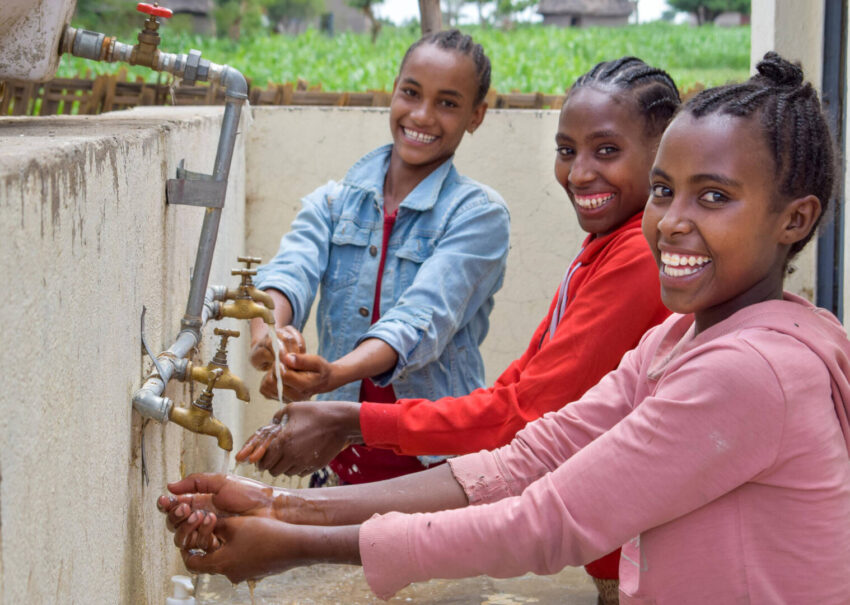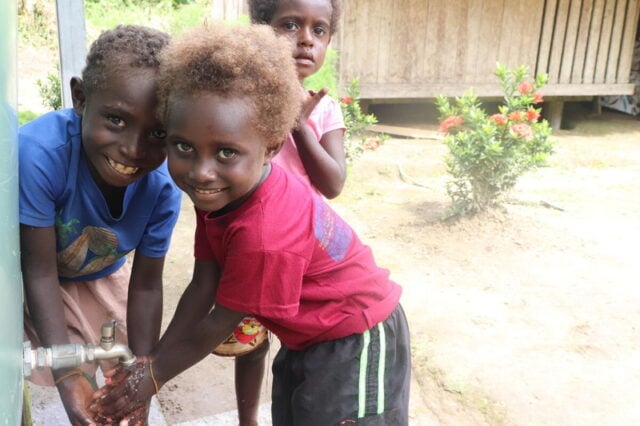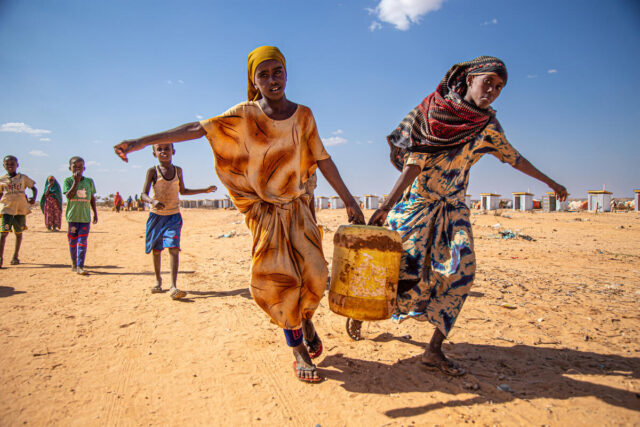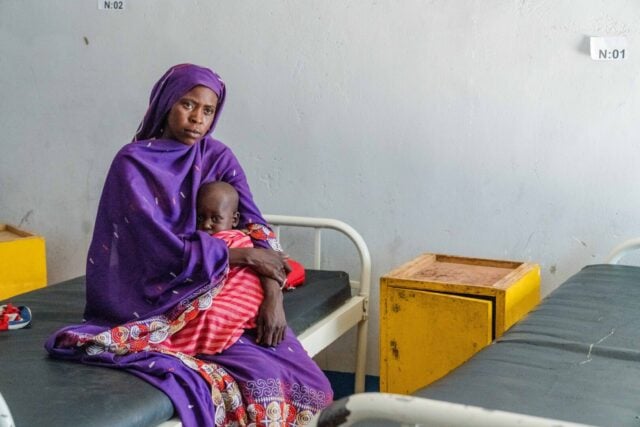When 17-year-old Bereket Abode did not appear at daybreak, her girlfriends, who had been waiting near her doorstep, trod toward the back of her sleeping room as lightly as they could and whispered her name. Awakened, she fumbled in the dark for her jerrycan, wrapped a shawl around her head and neck, and slipped out quietly with them.
“I had hard times waking up from deep sleep because of the energy I lost every day walking for hours carrying a water-filled container,” says Bereket.
Slinging the container by a strap across her back to the opposite shoulder, Bereket started a one-hour trek with Almaz, 14, and Nada, 13. The trio hurried in a bid to ward off the chilly morning air, get home quickly, and arrive at school on time. Bereket knew that if she arrived late, she would be denied entry, and a long absence would result in expulsion. She dreamt of becoming a teacher and wanted to work hard to succeed, but she felt held back. Many a time she was kept out. “I was very angry at the security guard but did not say a word. I walked back home feeling despondent,” she remembers indignantly.
Bereket, the fifth child of nine in her family, believed that only when her younger sisters grew to her age and took on her responsibilities would she be relieved. “Only then would I get respite, attend class regularly, focus on my education, and have spare time to attend Sunday school classes and rehearse songs,” she says.
Problems
The village of Dada, in Shashogo district in southwest Ethiopia, faced a chronic, generational problem with water access. The local government could not feel the community’s gnawing pain. Its population of 149,000 depends on rain-fed agriculture. The farming community grows various types of crops and rears farm animals for ploughing and livelihoods. Community children, mostly boys, look after cattle and many school-age children were unable to go to school.
Traditionally, female family members, especially girls, bore the brunt of household chores like fetching water. Life has always been grim for these rural girls. They would spend two to four hours hauling water every day. As sole caretakers of minors, they had little time for themselves or to focus on their education. They were not able to taste the enjoyable moments that childhood offers.
When Bereket turned 12, her age now defined her role as a provider, and the beating sun and pouring rain did not deter her from discharging her new responsibility of gathering water. One day, as she trudged through a rain-soaked field and muddy alley, she tripped and fell, the jerrycan still on her back. She worried about the amount of water needed to wash off the mud and the time required to do so. She fell into despondency, losing hope for a better life beyond the horizon. “The ordeal debilitated my vision,” Bereket says.

Bereket and her friends walked two hours each way to collect water from an open pond, a distance of 6 kilometers, or 3.7 miles, from her home. The man-made pond is the only source for both people and livestock in Dada. Wild animals like hyenas, foxes, hedgehogs, and porcupines also share the water. “It is scary and repulsive to think that we share the resource with them,” says Bereket.
Despite her efforts, the water she brought home was not enough for drinking, washing dishes, and laundry for a family of 11. The family cattle and goats, tethered to posts around her decorated thatched-roof hut, also drank the hard-earned water.
The brownish-yellow pond has sickened Bereket several times, necessitating treatment for waterborne diseases such as giardiasis and hookworm. Prior to letting her youngest siblings drink, she would tell them to wait until the silt in the muddy water settled out. Still, her siblings were not spared from waterborne diseases either.
Some better-off households with tin-roofed huts could collect rainwater through eavestroughs and did not need to go to the pond during the rainy season. Unfortunately, Bereket’s family’s thatched-roof house could not alleviate her burden, since gutters cannot be attached to straw to collect and store rainwater for drinking or other uses. So, Bereket would need to make a second trip to the pond in the afternoon.
“I got my schoolbag off, grabbed the jerrycan, which I considered my inseparable ‘mate,’ and hurried to the source, sometimes alone,” says Bereket.
The daily four-hour walk affected her attention in school.“While class was in progress, I sometimes slumbered and a girl [who] sat next to me … nudged me. I woke up confused and couldn’t shake off that feeling for a long time,” Bereket says. Her poor grades tempted her to drop out, but the thought engulfed her in fear; she knew the fate of a teen girl dropout. “My abhorrence of early marriage made me do whatever it took to avoid it,” she says.
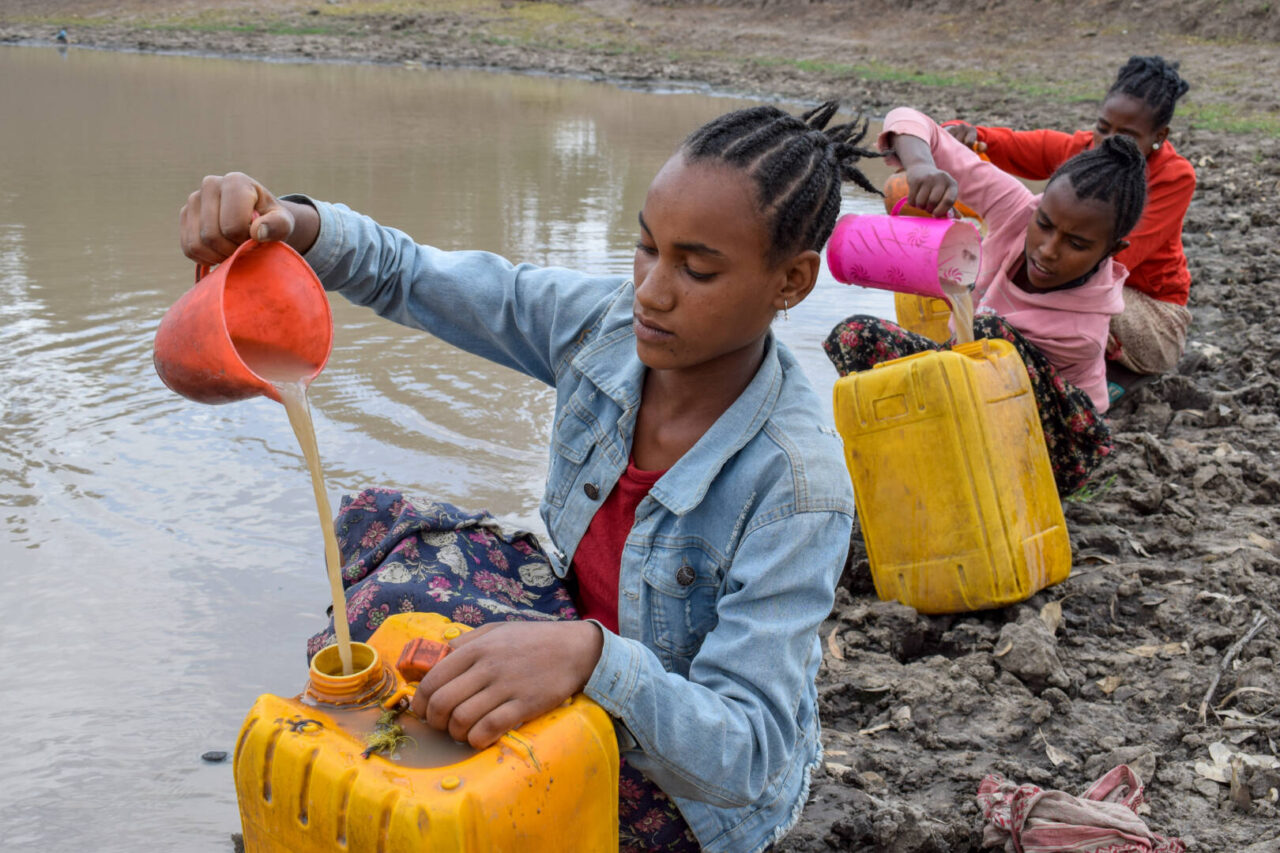
Dada Primary School, where Bereket was in her sixth year, also did not have tap water, which disrupted teaching and learning progress. Tamrat Makaro, the school head, says, “Small kids asked permission to go home to drink water and return, but they did not. We neither barred them from leaving class nor provided them with the very basic need.”
Dada Primary School had other challenges: It admitted far more students than its capacity. In Bereket’s class alone, there were 100 students, with three students sharing one desk. It was not convenient to copy notes from a chalkboard or possible to sit comfortably. The cement floor was cracked, and everything was dusty. Every Friday, students teamed up to take water to school from their homes to clean their respective classrooms. Bereket, too, brought water she’d carried home from the pond.
Having their periods also introduced problems for Bereket and other girls, preventing them from fully engaging in school and excluding them from many aspects of daily life. “I had no access to sanitary products because my parents could not afford [them],” she says. Instead, she stayed home three days a month during her menstrual cycle. “I did not tell anyone, even my mum, why I missed classes,” Bereket says, hanging her head in shame.
The natural phenomenon was a social taboo in her community. Only a few of her classmates, girls, tacitly understood the cause of her absence. They helped her catch up by lending her their exercise books. “They were my teachers,” she says, since they helped explain the lessons she’d missed.
Bereket gave various excuses at school for her frequent absences. “It’s not that easy to tell male teachers such a thing like this, you know,” she says, frowning. To add insult to injury, the school did not have a girls’ latrine or handwashing facilities. “I had to hold off the natural call or make up an excuse to be off to respond to the urge,” she remembers.
Changes
Out of concern for the safety and well-being of children and their families, World Vision began to assess and address the Dada community’s urgent needs. In 2020, a team of technical experts from the water, sanitation, and hygiene (WASH) division drilled a borehole well in the village.
Bereket could not believe her eyes when she saw a drilling rig cutting into the ground and water spurting to the surface. She remembered seeing a faucet for the first time when she went to a town market with her mother. “If it was going to be constructed in my village one day, it’d be a marvel, I thought,” Bereket recollects.
The WASH team completed installation of a water tap structure and handed it over to the district water office and community to jointly administer and maintain. “There was jubilation and hurrahs in the village,” Bereket remembers. She says it was surreal for everyone, especially for her and her friends Almaz and Nada.
“We have nothing to complain about the hardship any longer,” says Almaz. “From that time on we started a life without a challenge because of World Vision’s support.”
A water point with four faucets is now located near Bereket’s home, serving her and 1,600 others in Dada and beyond. The faucet she had viewed as a dream is now close by. She sees it as a miraculous intervention. “I envisaged such a time like this: a time when I would draw water from a faucet myself, stop walking long distance every day to the disgusting pond … and arrive at school in time, have enough sleep, study with [my] fellow girls, and live a happy life,” she says with a relieved sigh.
Nada says, “I thought that getting potable water at a close range was impossible in my lifetime, but it is here and real.”
Yet World Vision wasn’t done. In collaboration with the community, the organization built two blocks of eight classrooms and furnished them with 120 desks. In contrast to the previous class size, now 18 to 25 students learn per classroom.
Since the completion of the new classrooms, the girls’ enrollment ratio has increased significantly. “In [the] 2021 academic year, we had 221 female[s] and 211 male[s] in the school, and that was absolutely a new trend even in Shashogo district,” says Tamrat, the primary school head. “We are thrilled by World Vision’s transformative works.” Bereket is enjoying the new learning atmosphere, which has helped her improve her grades — ensuring her dream of becoming a teacher is within reach.
In addition to the new classrooms, World Vision built dedicated girls’ restrooms and provided handwashing basins and sanitizers. It also formed a WASH club in the primary school through which girls are taught about menstrual health. Healthy sanitation and hygiene practices, strengthening education around menstruation and puberty, and challenging discriminatory taboos are some of the topics covered. Through this club, girls have free access to sanitary items. And participants are taught to pass along the healthy practices they’ve learned in their homes and community.
The school education system has changed for the better because of World Vision’s support. Addise Erbato, 58, is the Shashogo district education office head. He says, “In eight out of 10 World Vision operation areas, there are no dropouts or absentees; 100% of school-age children are in school, and we are proud of the great organization.”
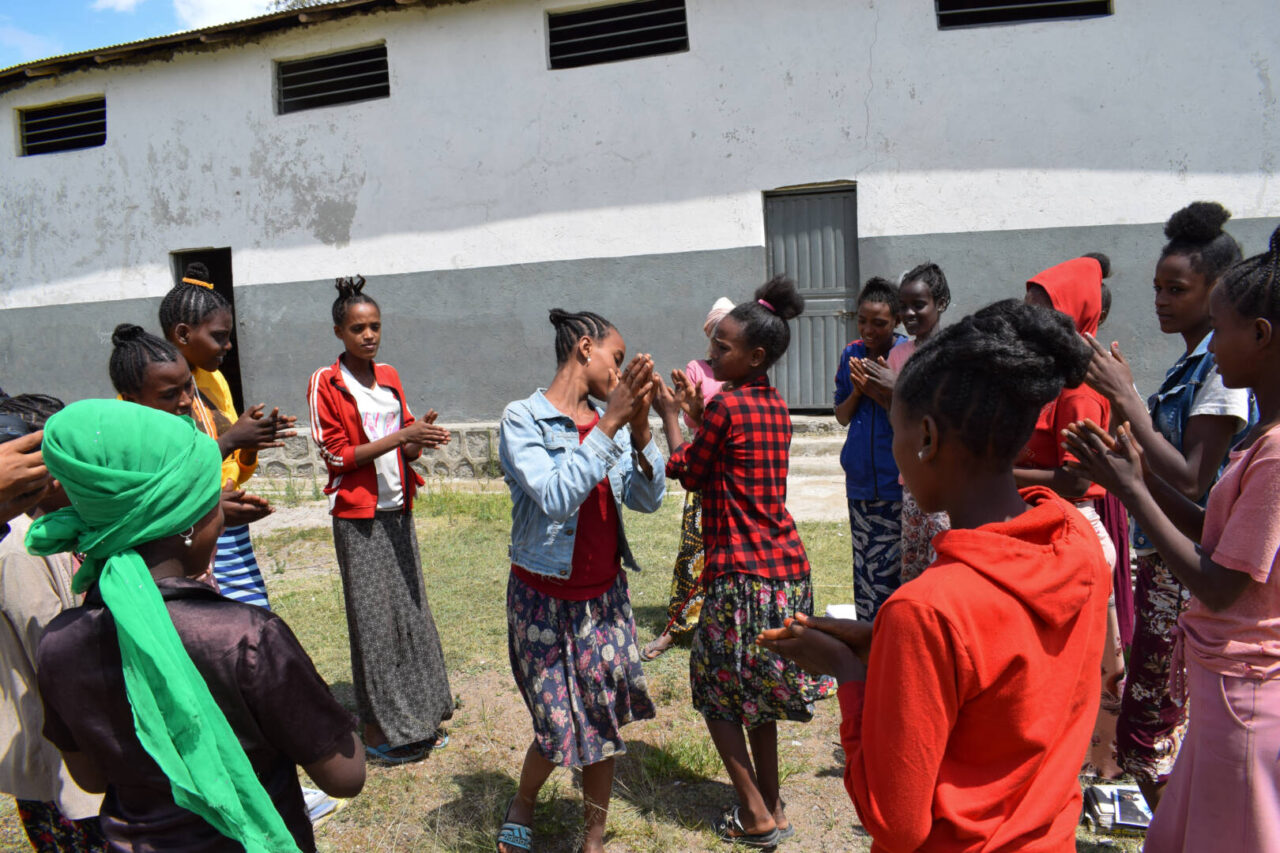
girls’ restrooms, and 100% attendance by school-age children. (©2021 World Vision/photo by Tamiru Chewaka)
Erbato says the water tank that World Vision has installed in schools and the education it offers children on horticulture development has helped them practice gardening in school demonstration sites and in their respective backyards, all of which have improved their dietary habits and income generation for their families. “We cannot list out all the good things World Vision has done for our school community. We are grateful for it,” he says.
Children’s health has also improved. Cheerful kids playing in fields are one marker of World Vision’s impact. Endale Desalegn, the district health office head, says, “Because of World Vision’s provision of safe water and education on personal hygiene and safe environment, waterborne diseases and poor hygiene cases are no longer issues. Health coverage for under-5 kids has reached 100%.”
The school improvements, education on feminine hygiene, and provision of sanitary pads have been life-changing for Bereket. “The organization has solved the mother of all problems and it is on us to work harder in school to recognize the good deeds,” she says.
Addressing spiritual needs
World Vision addresses not only communities’ physical needs but also their spiritual needs by partnering with local churches. In the program area that encompasses Dada village, staff offer capacity-building trainings to church ministers and Sunday school teachers and provide books and materials to Sunday school teachers and students.
The village population used to be nearly 100% non-Christian. Solomon Abate, pastor of Dada Selam K. H. Church, says that in 1999, for instance, there were 283 attendees in his church. People have been interested in learning more about Jesus as a result of experiencing changes in their community. As a result, that number has increased to 500 in 2021. “Many … communities, especially youth in Dada, are rapidly changing their religious faith to Christian,” he says.
Bereket is one of them.
Born to non-Christian parents, Abode Otoro, 70, and Amina Abode, 60, Bereket became interested in attending the local church. She has followed the teachings and behavior of her Sunday school teachers, and as a result her mom has seen a difference in her behavior. “I encourage her to be firm in her belief in Jesus because it is all good. I think her enviable behavior is because of the theological teachings,” Amina says. “She is different in many ways from non-believers. She has escaped the mess the world is in. I know what many teens are trapped in. My daughter is free from those things, to my happiness.”
Bereket’s parents have nine children, most of whom have chosen to become Christian. Their eldest son, Nuriye Abode, 45, is a father of 10. Although he hasn’t become a Christian, he has encouraged his three older children to follow Christ. Asked why, he responds, “I’ve [come] to understand that Christianity is a source of peace, love, generosity, and obedience. Christian children are well-disciplined, and I have observed these values [in] my sister, Bereket, whose name means ‘a blessing.’”
Bereket affirms this, saying, “In fact the discipleship teaching has kept me out of all sorts of trouble that often come with teen age.”
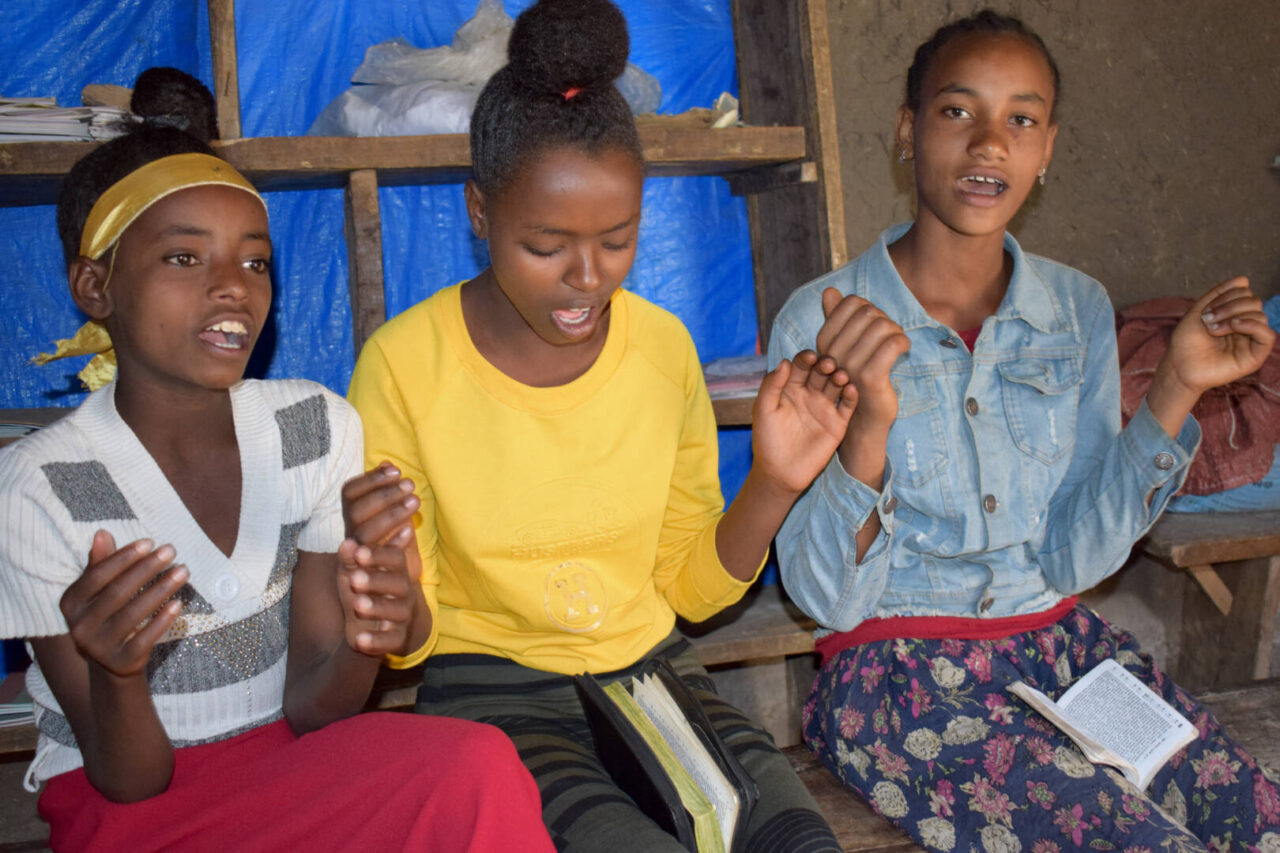
Non-Christian community members who have benefited from World Vision’s programs are enthralled by the organization’s equal treatment of all, and many have accepted Jesus as their Savior as a result. Seyum Abose, 60, who pastors Kalehiwot Church in Bonosha, the capital of Shashogo district, diligently works with World Vision’s faith and development team to strengthen church ministry. He says that before World Vision’s work, Shashogo district was only 15% Christian. “It was very difficult to preach [the] gospel, and [many] who dared fled the area for fear of persecution.”
Mohammad Hafebo is Faith-Based Forum co-chair and secretary of 65 evangelical churches in the district. He was born in Dada village and not raised in a Christian household. He says that two decades ago, Dada was known for persecuting evangelical Christian believers who had changed beliefs from other faith backgrounds. “I was the only Muslim person who, for the first time in 2001, received Jesus Christ as my Savior,” he says. He knew his decision would risk his life, but he trusted the Lord would protect him.
As a young man, he saw a boy hanging from a tree and being whipped by mobs because of his faith. He intervened, begging the whippers for mercy and saving the boy’s life, but later fled his home village. Fellow Christians gave him shelter, fed him, and paid for his school fees. Upon graduation, he began to serve in the church. Years later, after World Vision began working in his village, he returned and was greeted by people who had begun to understand differences and accept similarities.
Mohammad has an avid interest in preaching the gospel among the new generation and supports World Vision’s ministry, specifically strengthening Sunday schools. He admires the paradigm shift brought about in Dada. “It is World Vision that has brought harmony between the Christian and Muslim community here,” he says. “When children become naughty and stubborn, parents in my neighborhood and beyond advise their children seriously to go to church,” he laughs. Mohammad says the transformative work creates opportunities for people to experience God’s love in Jesus. About 2,000 people join local churches each year as they decide to nurture their relationship with God within the Christian faith. Today the population in Shashogo stands at 65% Christian.
Bereket today
Now that clean water is just a three-minute walk from Bereket’s home, she doesn’t need to walk hours every day to a dirty water source, she doesn’t miss class, and she never gets sick from waterborne diseases. She doesn’t share a desk with other students and attends a school that is up to code. She even receives sanitary pads for free.
And she is living life to the fullest. Now her heart drives her to focus on being an ardent and vibrant follower of Christ through attending Bible study and fellowship regularly and singing praises to Him in children’s choir.
“I always yearn for God’s faithful presence in my life; to be an irrepressible follower of Christ,” she says, citing Mathew 4:4 in which Jesus said, “It’s written, people won’t live only by bread, but by every word spoken by God” (CEB).
To quench her spiritual thirst, she meets with her church friend, Tigist, 15, to read the Bible and reflect on her understanding. In addition to World Vision’s sponsorship program, which has transformed her former dismay to hope and vision, she appreciates how the church that World Vision supports has helped her find lasting meaning in her life.
“Life is clueless without Jesus,” Bereket asserts.
Bereket has chosen Jesus for her life. She cannot go without mentioning that World Vision’s support has won her heart as well as those of her friends and every person in her circle. Bereket’s good behavior, tolerance, and kindness have even influenced her Muslim friends Almaz and Nada. “She accepts us for who are, and we admire her character, which is exemplary,” they say, smiling. “And we know where that originates.”
